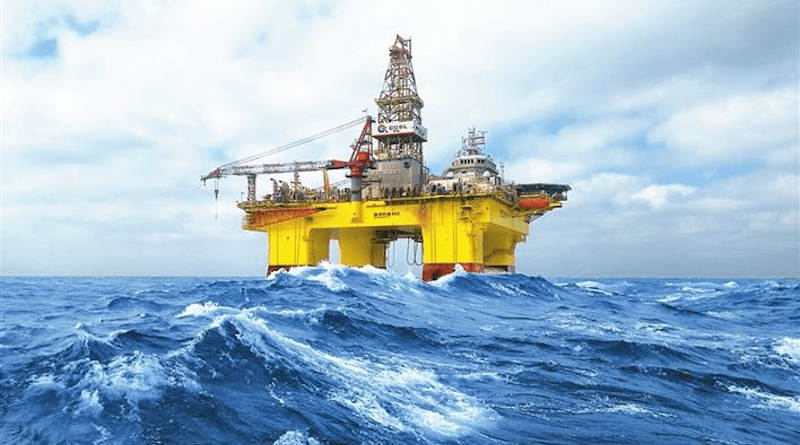South China Sea: Hunt For Oil And Gas Increases Risk Of Flashpoints – Analysis
By RFA
Almost all the claimants in the South China Sea are moving forward with new oil and gas exploration projects this year, heightening the risk of confrontations and even clashes in disputed waters, a new report said.
The report by the Asia Maritime Transparency Initiative (AMTI) at the Center for Strategic and International Studies (CSIS) in Washington said many of the new exploration projects are inside the so-called nine-dash line used by China to delineate its claims in the sea.
Six parties – Brunei, China, Malaysia, the Philippines, Taiwan and Vietnam – hold overlapping claims with China over parts of the South China Sea.
Last year “was comparatively quiet when it came to tensions over hydrocarbons,” the report said, warning that “with new offshore projects in 2023, oil and gas development could reemerge as a primary flashpoint in the disputes.”
China, Indonesia, Malaysia and Vietnam are pursuing new oil and gas projects but the Philippines continues to suspend all projects in disputed waters of the South China Sea, which has been policy since 2014, according to AMTI.
China has begun several gas projects south of Hainan Island including two gas fields in the Yinggehai Basin and another two in the Qiongdongnan Basin.
These gas fields are located in areas claimed by both Vietnam and China, the report noted.
‘Exceeded expectations’
Vietnam, which has long been reliant on incomes generated from crude oil exports, said its oil and gas business results have exceeded expectations in 2022.
A report on the Vietnam Energy website said the state oil and gas corporation PetroVietnam “surpassed itself in all production and business targets” for the year.
The firm’s total oil production reached 10.84 million tons in 2022 and the gas production reached 8.08 billion cubic meters, the report said.
Vietnam and China have had many disputes over oil and gas activities in the South China Sea in the past. Hanoi accused Beijing of constantly harassing its drilling platforms and pressuring foreign companies to stop working with Vietnamese partners.
Yet the new AMTI report said Russia’s state-owned Zarubezhneft, which operates Block 06-1 in Vietnam’s Nam Con Son basin, continues its operation despite the area “being patrolled almost daily by the China Coast Guard since mid-2020.”
A gas field nearby, Sao Vang-Dai Nguyet, operated by Japan’s Idemitsu Kosan, “has also quietly come online.” Idemitsu completed a central processing platform for the project in 2021 and PetroVietnam said it started producing gas in August, 2022.
Besides this, PetroVietnam also began extracting gas from four new wells and fields last year.
Foreign partners such as Harbour Energy, ExxonMobil and ONGC Videsh Ltd. have all held on to their investments in Vietnam, according to the AMTI report.
“In view of increasing panic about a military threat from China, it’s striking that the military response has been confined to saber-rattling – coast guard standoffs and the like,” said John Quiggin, professor of economics at the University of Queensland, Australia.
“One implication is that the Chinese government is fully aware of the potential costs of starting a war with its neighbors,” Quiggin told Radio Free Asia, a news agency affiliated with BenarNews. “Another is that the resources in question probably aren’t worth fighting over.”
China’s harassment
Quiggin has been playing down the importance of the oil and gas reserves in the South China Sea, saying the quantities are “smaller than they seem.”
However, China seems determined to prevent neighboring states from conducting oil and gas exploration within the areas it claims, despite the nine-dash line being ruled as illegal by a United Nations tribunal in 2016.
In January, Indonesia approved a U.S. $3 billion plan to develop the Tuna gas fieldat the southern edge of the line. “Shortly after the announcement, China’s largest coast guard vessel was seen navigating near the area,” AMTI said.
Similarly, the China Coast Guard has been patrolling near Malaysia’s exploration blocks off Sarawak.
“Despite multiple incidents with the China Coast Guard in recent years, Kuala Lumpur has continued to push ahead on several oil and gas projects in the South China Sea,” the AMTI report said.
“Manila briefly permitted exploration at Reed Bank last spring, but quickly shut it down amid challenges from the China Coast Guard,” the report noted.
Greg Poling, AMTI director, told RFA the reason could be that Reed Bank “has experienced so much harassment over the years.”
“The Philippines has a reasonable expectation that China will more forcefully block new work there than it does elsewhere in the South China Sea,” Poling said.
“But I think this data suggests that it is probably time for Manila to try again,” he said.
At the same time, Quiggin warned that countries in the region “shouldn’t relax.”
“It’s easy for this kind of confrontation to turn into actual shooting, as has happened on the land border between India and China.”

